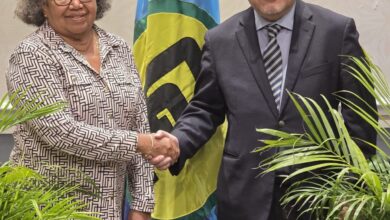Caribbean governments have agreed to implement an aggressive advertising programme to get tourism, the main foreign exchange earner for a number of countries, back on track following the decline in arrivals after the September 11 terrorist attacks in the United States.
This was a major decision emerging from the Summit on Tourism held at Atlantis Resort, Paradise Island, The Bahamas 8-9 December 2001, under the chairmanship of the Prime Minister of The Bahamas, Rt. Hon Hubert Ingraham.
The advertising programme, a joint public/private sector initiative, will cost approximately US$16 million and will complement a marketing initiative that the Caribbean Tourism Organisation (CTO) is already implementing in key marketplaces.
The meeting, attended by CARICOM Heads of Government as well as representatives from the tourism private sector, discussed and took decisions on a number of issues critical to the survival and sustainment of Caribbean tourism. Some of these were as follows:
Cruise Tourism
The Meeting agreed to establish a Caribbean Cruise Committee, comprising public and private sectors representatives to:
(1) promote effective collaboration between the cruise and land-based segments of the Caribbean tourism industry and policy makers; and
(2) increase linkages, stimulate growth and maximise benefits to the Region;
The Committee will be co-chaired by Ms. Michelle Paige of the Florida Caribbean Cruise Line Association (FCCA) and Mr. Butch Stewart, Chairman of Sandals Resort.
It was agreed that while open-ended, the core membership would comprise three Member States (one Northern, one Central and one Eastern Caribbean State), three cruise line, three Caribbean Hotel Association (CHA), three other interest groups, the Caribbean Tourism Organisation (CTO), the Organisation of Eastern Caribbean States (OECS) and the Caribbean Community (CARICOM) Secretariat;
It was further agreed that the Committee would submit its first report to the Council for Trade and Economic Development (COTED), for consideration, by 30 June, 2002.
The decision to set up the special committee was out of recognition that cruise tourism has, over the past decade, been the fastest growing segment of the tourism industry globally and in the Caribbean, and that there was significant scope to increase contribution of the cruise sector to the destinations, in the overall sustainability of Caribbean tourism;
During the Meeting, hoteliers expressed concern that cruise operators were being granted concessions which gave them strong advantage over land-based operators, who generated greater revenue and employment in the destinations.
It was however stressed that the Region's strategy was to encourage the development of all segments of the tourism industry, on as equitable a basis as is feasible. It was also accepted that there was need for greater collaboration between the land-based and cruise segments of the industry, and with policy makers, in order for the Caribbean to maximise the potential benefits of the tourism industry.
Human Resource Development
To meet the demands and expectations of the new thrust, the Meeting agreed that a Tourism Development Fund should be established to provide support at the National and regional levels.
At the National Level it was agreed that:
(a) there should be strengthening of the tourism/hospitality institutions (including community colleges and universities), to improve facilities, equipment, retain quality staff, etc.;
(b) assistance should be given to micro, small and medium tourism enterprises in meeting their training needs;
(c) research should be conducted in critical areas, as determined by government and industry, to underpin policy and decision-making;
(d) tourism awareness programmes at the national level should be supported and
At the Regional Level it was agreed that
(i) the Caribbean Human Resource Council should be established to the tune of US$150,000 per annum (to cover two professional staff persons and one support staff person and a small programme support budget).
(ii) an Institute of Tourism Research operated by the University of the West Indies (UWI) should be established to systematically address areas of priority for the sector;
(iii) regional Tourism Leadership Symposia in the Region should be conducted, drawing on tourism best practices. This would be spearheaded by the UWI and linked to its institutes of business and the UWI Tourism Research Institute working in partnership with the CTO and CHA;
(iv) there should be the establishment of a Tourism Gateways Youth Programme in the Region linked to occupational standards and certification which would require funding to the order of US$350,000.
Safety and Security
The Meeting further noted that safety and security issues have moved to the top of the traveller concerns and will remain so for the near and long terms since they are an intangible determinant of choice.
The main policy recommendations related, inter alia, to fostering community awareness and linkages; the development of systems which recognise the transient nature of tourists and policies which support regional and international health and security standards; and, policies which ensure visitor safety. The meeting, also received a report from an aviation expert who among other issues recommended the strengthening of safety and security for airline passengers and priority to airports where required.





